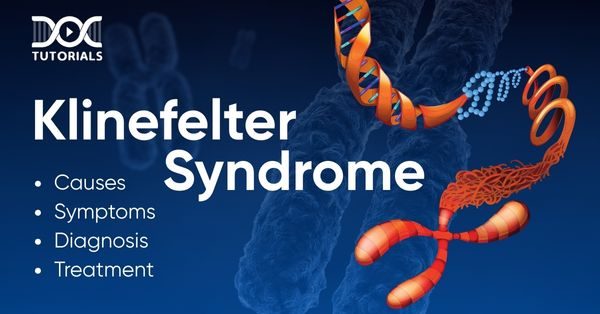Klinefelter Syndrome: Causes, Symptoms, Diagnosis, and Treatment

Klinefelter syndrome is a genetic disorder in which men inherit an extra X chromosome. While most men have 46 chromosomes, those with Klinefelter syndrome possess 47 chromosomes. It is also a common disorder prevalent in 1 out of 500-100 newborn males worldwide. This condition is present from birth; however, its symptoms vary from one person to another.
If you are a NEET PG 2025 aspirant, understanding the causes, symptoms, diagnostic methods, and treatment of Klinefelter syndrome is crucial. Proper knowledge of this condition will not only enhance your medical knowledge but also prepare you to identify and address such cases in clinical practice.
What is Klinefelter Syndrome?
Also known as XXY chromosome disorder, Klinefelter syndrome is a genetic condition in which males have an extra X chromosome. Usually, males have 46 chromosomes, which include one X and one Y (46, XY). However, individuals with Klinefelter syndrome have 47 chromosomes (47, XXY). Some receive a diagnosis early in life, while others remain unaware until adulthood when issues like infertility arise.
What are the Causes of Klinefelter Syndrome?
Klinefelter syndrome happens due to a random change in the egg or sperm, leading to the birth of a baby assigned male at birth with an extra X chromosome. This genetic condition does not get inherited from families.
There are a few ways (causes) of how Klinefelter syndrome can develop:
- The most common cause is having one extra X chromosome in every cell (XXY).
- Some individuals have an extra X chromosome in only some of their cells, known as mosaic Klinefelter syndrome, which usually results in milder symptoms.
- In rare cases, a person may have more than one extra X chromosome, which can lead to a more severe form of the condition.
In males, one extra copy of genes on the X chromosome can disrupt sexual development and fertility.
What are the Risk Factors of Klinefelter Syndrome?
Men with Klinefelter syndrome usually have low testosterone levels, which can affect their sexual function. Low testosterone also directly impacts fertility. This makes it difficult for some men with Klinefelter syndrome to biologically father children. However, this is not always the case, as some may still have the ability to conceive.
What are the Symptoms of Klinefelter Syndrome?
Klinefelter syndrome symptoms can vary widely from person to person. Some individuals may not display noticeable symptoms or even realise they have the condition. Others may experience a range of symptoms based on their age and the severity of the syndrome.
- Symptoms in Babies
Symptoms of Klinefelter syndrome in babies and young children can be subtle and often go unnoticed since child development varies greatly. However, you may want to consult your child’s paediatrician if you notice:
- Delays in speech development
- Delays in crawling or walking
- A quieter or more passive temperament
- Symptoms in Young Males and Teenagers
Klinefelter syndrome symptoms often become more noticeable at puberty. If your child experiences any sort of learning issues, it is important to trust your instincts and seek medical advice. Some common symptoms include:
- Difficulty in focusing or paying attention
- Mild dyslexia
- Challenges with social interactions
- Low energy levels
- Delayed puberty, which may involve:
- A higher-pitched voice
- Lack of facial or body hair
- Difficulty in building muscle tone
- Fat accumulation around the hips and buttocks, giving a rounder lower body shape
- Taller stature compared to family members, often with long arms and legs
- Enlarged breasts (gynecomastia)
- Smaller penis
- Smaller testicles
- Symptoms in Adults
The most common symptom in adult males is fertility challenges, although many treatments are available to address this. Adults with an extra X chromosome in only some of their cells tend to have milder symptoms. On the other hand, males with more than one extra X chromosome may experience more severe symptoms, including:
- Significant learning and speech difficulties
- Poor coordination
- Distinctive facial features
- Bone abnormalities
How to Diagnose Klinefelter Syndrome?
Many men with Klinefelter syndrome (KS) either go undiagnosed or receive a diagnosis quite late. This delay often happens due to low awareness and the absence of consistent symptoms in all affected individuals. Early detection through chromosomal analysis in newborns with abnormal testicular development is crucial to improve diagnostic rates.
Here are some of the diagnostic methods used to identify Klinefelter syndrome:
- Hormonal Assays
Hormonal assays measure fluctuations in hormone levels commonly seen in KS. While these tests do not confirm the condition, they play a vital role in guiding treatment strategies. Recommended hormonal assays include:
- Follicle-stimulating hormone (FSH)
- Luteinizing Hormone (LH)
- Testosterone
- Gonadotropins
- Karyotyping (Chromosome Analysis)
Karyotyping remains the gold standard for confirming KS. In this method, a blood sample is used to examine chromosomes under a microscope. Regardless of age, the karyotype test consistently reveals chromosomal abnormalities, making it the most reliable diagnostic tool.
- Testicular Biopsy (TESE)
TESE requires extracting a small tissue sample from the testicles for examination. Men with KS often show altered testicular structure and function. Since testicular biopsy is expensive and invasive, doctors usually recommend it only for patients with negative karyotyping results but relatable symptoms.
- Prenatal Testing
Klinefelter syndrome can be detected before birth, typically between the 11th and 14th weeks of pregnancy. Some common prenatal tests are as follows:
- Amniocentesis: This test analyses the amniotic fluid that surrounds the baby during pregnancy.
- Chorionic Villus Sampling (CVS): Doctors take a small sample of cells from the placenta to perform a test. The placenta links the mother’s blood supply to the growing baby.
- Cell-free DNA Testing: This non-invasive test checks for chromosomal abnormalities by analysing the baby’s DNA circulating in the mother’s bloodstream.
Although these prenatal tests come with a small risk of miscarriage, doctors usually recommend them only under specific conditions, such as:
- The mother is 35 years or older.
- The mother previously had a baby with chromosomal abnormalities.
- Abnormal findings on a fetal ultrasound.
What are the Complications of Klinefelter Syndrome?
People with Klinefelter syndrome chromosome face a higher risk of developing certain metabolic conditions that include:
- Obesity (body mass index over 30)
- Hypertension (high blood pressure)
- Type 2 diabetes
- High cholesterol
- Elevated triglyceride levels (a type of fat in the blood)
Apart from metabolic issues, individuals with Klinefelter syndrome may also experience:
- Gynecomastia
- Breast cancer
- Tremors
- Osteoporosis (weakened bones)
- Autoimmune disorders (such as type 1 diabetes, thyroid disease, lupus, and rheumatoid arthritis)
- Seizure disorders
- Learning challenges, particularly with language skills
How to Treat Klinefelter Syndrome?
People with Klinefelter syndrome are born with the condition as it is part of their genetic makeup. While there is no treatment to cure or eliminate it, individuals can effectively manage the symptoms through appropriate Klinefelter syndrome treatments from healthcare professionals.
- Testosterone Replacement Therapy
Doctors often prescribe testosterone replacement therapy to boost strength, body hair growth, energy, and concentration. This treatment usually comes in the form of injections, pills, gels, or patches. Starting therapy at puberty can help minimise the long-term effects of reduced testosterone production. However, it does not improve testicle size or fertility.
- Fertility Treatment
Most men with KS (95-99%) are infertile due to insufficient sperm production. However, around 50% of affected individuals produce some sperm. For those with minimal sperm production, intracytoplasmic sperm injection (ICSI) can be an option. This process involves the extraction of sperm from the testicle and directly injecting it into the egg.
Early diagnosis allows for semen or testicular tissue preservation through cryopreservation, typically before puberty. This process uses very low temperatures to store living cells and tissues for future use.
- Breast Reduction Surgery
Men with overdeveloped breast tissue can opt for breast reduction surgery performed by a plastic surgeon. While no approved medication addresses enlarged male breasts, surgery can result in a more masculine chest appearance. This procedure not only reduces the risk of breast cancer but also helps lessen the social stress linked to enlarged breasts.
- Psychological Counselling
KS symptoms, particularly during puberty and early adulthood, can cause embarrassment and stress. Infertility can also lead to emotional challenges. Psychological counselling provides support to manage these feelings and develop coping strategies.
- Therapeutic Support
Supportive therapies can improve language skills, school performance, and social interactions. These may include:
- Speech and physical therapy
- Educational evaluation and support
- Occupational therapy
- Behavioural therapy
FAQs about Klinefelter Syndrome
- What changes occur in males with Klinefelter syndrome?
Males with Klinefelter syndrome have 47 chromosomes instead of the typical 46. This genetic condition leads to physical and intellectual challenges. This increases the risk of health issues like diabetes, cardiovascular disease, osteoporosis, infertility, and disabilities.
- At what point during pregnancy can Klinefelter syndrome be detected in the fetus?
Klinefelter syndrome can be diagnosed during pregnancy through specific tests. Chorionic villus sampling (CVS), performed around 10 to 12 weeks, involves testing a small sample of the placenta. Alternatively, amniocentesis, performed at approximately 16 to 18 weeks, examines a sample of amniotic fluid surrounding the baby.
- Can Klinefelter syndrome cause infertility?
Yes, most males with Klinefelter syndrome experience infertility due to low sperm production. However, some may still produce minimal sperm, and assisted reproductive techniques like intracytoplasmic sperm injection (ICSI) may help.
- Is it possible for men with Klinefelter syndrome to have biological children?
Most men with Klinefelter syndrome (about 95 to 99%) cannot conceive naturally due to low sperm production. However, advanced reproductive techniques like Intracytoplasmic Sperm Injection (ICSI) can make fatherhood possible. In this procedure, sperm is extracted using a biopsy needle and injected directly into the egg.
- Does Klinefelter syndrome influence mental well-being?
Yes, Klinefelter syndrome can lead to social and behavioural difficulties, along with mental health challenges like anxiety and depression. Counselling and therapeutic support can help individuals manage these challenges more effectively.
Conclusion
If parents notice any symptom of Klinefelter syndrome in their child, they should consult a specialist trained to diagnose and manage such disorders. Early intervention and tailored treatment strategies can significantly improve quality of life and long-term health outcomes. If you are preparing for exams like NEET PG, you need to have a clear knowledge of such syndromes. At DocTutorials, we offer specialised NEET PG study materials designed to make your preparation faster and more efficient.
Latest Blogs
-

NEET PG Exam 2025- Date, Pattern, Marking Scheme, Subject Wise Weightage, and Exam Mode
NEET PG Exam 2025 is the ultimate gateway for medical graduates aspiring to pursue postgraduate courses in medicine, including MD,…
-

INI CET Exam 2025: Your Roadmap to Success – Key Topics, Strategies, and Lessons from Last Year’s Papers
The INI CET exam is more than just a test; it’s a significant milestone for many medical students aiming to…
-

INI CET Exam Success: Previous Year Question Papers & Ultimate Guide – INI CET PYQ
One can feel overwhelmed while preparing for the INI CET (Institute of National Importance Combined Entrance Test). A vast syllabus,…




